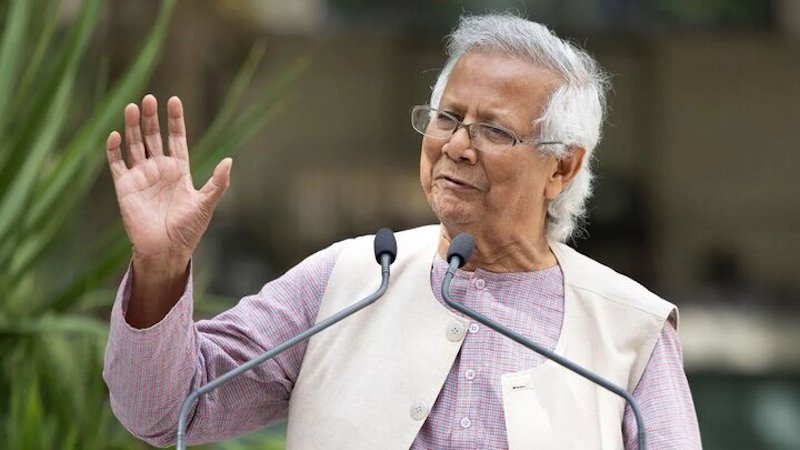By Imran Ahmed
In his recent national address, Bangladesh’s interim government leader, Muhammad Yunus, laid out a tentative timeline for the country’s democratic future stating that general elections could occur by late 2025 or early 2026.
Yunus’ statement, though cautious, underlines the challenges facing his post-revolution government as it seeks to rebuild Bangladesh’s fractured political landscape. The announcement reflects both the magnitude of the reforms required and the simmering tensions surrounding the nation’s transition from the authoritarian grip of Sheikh Hasina’s 15-year rule to a future anchored in democratic legitimacy. Yunus’ focus on a ‘flawless’ voter list and comprehensive reforms of governing structures and institutions reveals a deeper dilemma: can the interim government balance the urgency for elections with the demand for systemic change?
His announcement also comes amidst mounting pressure to set an election roadmap and a specific election date. While acknowledging the statement as progress, Bangladesh Nationalist Party (BNP) leaders, including Amir Khasru Mahmud Chowdhury, criticised it for lacking a structured plan, describing Yunus’ remarks as merely an idea rather than a clear roadmap for credible elections. Nevertheless, Yunus has urged that reforms must precede any polls, framing his government’s agenda as one of restoration rather than political expediency. “If the political parties agree to hold the election on an earlier date with minimum reforms”, Yunus said, “the election could be held by the end of November.”
At the core of Yunus’ electoral reform agenda is an updated voter list, a deceptively simple yet notably complex challenge. After years of politically manipulated elections, voter rolls have become symbols of institutional decay. Purging false names, addressing registration backlogs and enfranchising Bangladesh’s burgeoning youth population remain essential but time-consuming tasks. Yunus’ vision of achieving a ‘100 per cent voter turnout’ is aspirational but it also raises questions about whether the interim administration can mobilise the necessary resources and consensus to achieve such a feat within his proposed timeline.
Some analysts fear delays could worsen political divisions. “The longer the election is delayed, the greater the risk of unrest”, said Dr Sayeed Alam, a political scientist at Dhaka University. He added that “Bangladesh’s history shows that power vacuums often lead to instability.” Earlier, Mirza Fakhrul Islam Alamgir, Secretary-General of the BNP, insisted that only a democratically elected government can address Bangladesh’s deep-rooted issues and rebuild public trust in state institutions. “The people’s preference for a political party will be determined through elections”, Alamgir said. He continued, “That is why we strongly advocate for elections to be held as soon as possible. Elections will resolve many challenges and debates that persist today. Until then, arguments and debates will continue.”
There are also other pressing challenges. The recent White Paper on the State of the Bangladesh Economy reported years of economic mismanagement and significant financial losses under the previous Awami League government. Prepared by a 12-member committee of independent experts led by economist Debapriya Bhattacharya and set up by the interim government, the report outlined rising inequality, crony capitalism and manipulated economic data that masked the true state of the economy. Bhattacharya said, “The whole system was politicised, and there was a narrative of a high-performing economy. But in reality, it was not that.” While the report offers paths to address Bangladesh’s economic challenges and rebuild public and investor confidence, the findings spotlight the immense challenge of addressing issues of corruption, debt and transparency in public spending.
Finally, there is renewed hope in the country as activists and citizens reclaim public spaces and push for change and justice for past wrongs. However, Bangladesh stands at an unusual turning point where growing public freedoms coexist with lingering authoritarian practices such as surveillance and arbitrary detentions. This suggests that transitioning from authoritarian rule not only requires dismantling the entrenched systems of control that have stifled dissent and perpetuated inequality, but it also involves creating an environment where the citizens feel safe to engage in political and social discourse without fear of reprisal. Whether Bangladesh can forge a governance model that prioritises accountability and justice remains the most pertinent longer-term concern. Success will require not just the reform of broken systems but also the cultivation of a political culture where power is shared and contested peacefully.
- About the author: Dr Imran Ahmed is a Research Fellow at the Institute of South Asian Studies (ISAS), an autonomous research institute at the National University of Singapore (NUS). He can be contacted at [email protected]. The author bears full responsibility for the facts cited and opinions expressed in this paper.
- Source: This article was published by Institute of South Asian Studies

